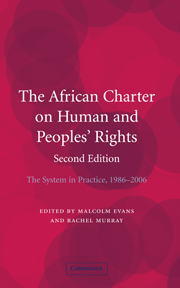Book contents
- Frontmatter
- Contents
- List of contributors
- Table of cases
- List of abbreviations
- Editors' Preface
- Introductory Preface: The African Charter and African Commission on Human and Peoples' Rights
- 1 The African Union and the Regional Human Rights System
- 2 The State Reporting Mechanism of the African Charter
- 3 Communications under the African Charter: Procedure and Admissibility
- 4 Evidence and Fact-Finding by the African Commission
- 5 Civil and Political Rights in the African Charter on Human and Peoples' Rights: Articles 1–7
- 6 Civil and Political Rights in the African Charter: Articles 8–14
- 7 Group Rights
- 8 The Role of Non-governmental Organisations and National Human Rights Institutions at the African Commission
- 9 A View from the Inside: The Role of the Secretariat
- 10 The Special Rapporteurs in the African System
- 11 Working Groups of the African Commission and their Role in the Development of the African Charter on Human and Peoples' Rights
- 12 The Creation of a New African Court of Justice and Human Rights
- 13 Protocol to the African Charter on the Rights of Women in Africa
- Bibliography
- Index
11 - Working Groups of the African Commission and their Role in the Development of the African Charter on Human and Peoples' Rights
Published online by Cambridge University Press: 01 July 2009
- Frontmatter
- Contents
- List of contributors
- Table of cases
- List of abbreviations
- Editors' Preface
- Introductory Preface: The African Charter and African Commission on Human and Peoples' Rights
- 1 The African Union and the Regional Human Rights System
- 2 The State Reporting Mechanism of the African Charter
- 3 Communications under the African Charter: Procedure and Admissibility
- 4 Evidence and Fact-Finding by the African Commission
- 5 Civil and Political Rights in the African Charter on Human and Peoples' Rights: Articles 1–7
- 6 Civil and Political Rights in the African Charter: Articles 8–14
- 7 Group Rights
- 8 The Role of Non-governmental Organisations and National Human Rights Institutions at the African Commission
- 9 A View from the Inside: The Role of the Secretariat
- 10 The Special Rapporteurs in the African System
- 11 Working Groups of the African Commission and their Role in the Development of the African Charter on Human and Peoples' Rights
- 12 The Creation of a New African Court of Justice and Human Rights
- 13 Protocol to the African Charter on the Rights of Women in Africa
- Bibliography
- Index
Summary
Introduction
Throughout its first twenty years of existence, the African Commission on Human and Peoples' Rights (hereinafter referred to as ‘the African Commission’) has evolved methods and mechanisms to discharge its mandate, which is enshrined under Article 45 of the African Charter on Human and Peoples' Rights (hereinafter to be referred to as ‘the African Charter’). The mandate of the African Commission is to promote and protect human and peoples' rights in Africa, interpret the African Charter and perform other tasks as may be entrusted to it by the Assembly of the African Union.
Article 46 of the African Charter gives the African Commission wide scope to employ various methods in the discharge of its mandate. It specifically states that:
[t]he Commission may resort to any appropriate method of investigation, it may hear from the Secretary-General of the Organisation of African Unity or any person capable of enlightening it.
The African Commission has, over the years, established special mechanisms, otherwise known as special rapporteurs, to deal with thematic human and peoples' rights issues that are of burning and urgent concern on the continent. Similarly, the African Commission has established working groups to deal with human and peoples' rights issues under its mandate. Their terms of reference vary in nature. The working groups have dealt with thematic as well as important organisational and administrative matters related to the work and mandate of the African Commission.
In doing so, the African Commission may have borrowed a leaf from international practice.
- Type
- Chapter
- Information
- The African Charter on Human and Peoples' RightsThe System in Practice 1986–2006, pp. 379 - 405Publisher: Cambridge University PressPrint publication year: 2008

